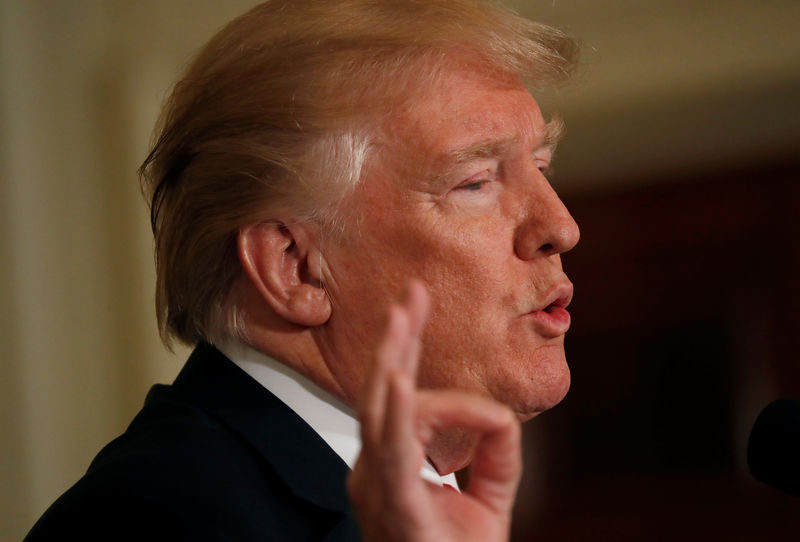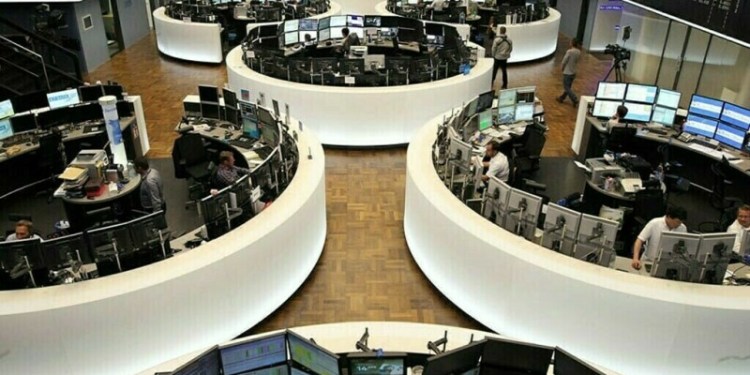 © Reuters. U.S. President Donald Trump meets with Swedish Prime Minister Stefan Lofven in the Oval Office at the White House in Washington
© Reuters. U.S. President Donald Trump meets with Swedish Prime Minister Stefan Lofven in the Oval Office at the White House in WashingtonBy Susan Heavey, Richard Lough and Ben Blanchard
WASHINGTON/PARIS/BEIJING (Reuters) – President Donald Trump promised on Thursday to show great flexibility and cooperation toward the United States’ “real friends” as he prepared to impose import tariffs that have provoked warnings of a trade war from Europe and China.
Trump had been expected later in the day to sign a proclamation imposing 25 percent tariffs on steel imports and 10 percent on aluminum, but this could slide into Friday.
A White House official also said on Wednesday night that Trump planned to offer Canada and Mexico – fellow signatories of the North America Free Trade Agreement (NAFTA) – the possibility of a 30-day exemption from the tariffs.
But both Brussels and Beijing made clear they were ready for any trade war, with one European Union official saying retaliation could also target goods from areas governed by Trump’s Republican Party.
Trump tweeted that he was looking forward to a meeting at 3.30 p.m. (2030 GMT) at the White House. He did not say whether he would sign the proclamation then.
However, he added: “We have to protect & build our Steel and Aluminum Industries while at the same time showing great flexibility and cooperation toward those that are real…and treat us fairly on both trade and the military.”
Trump did not name the countries he regarded as friends, or say what he had in mind for them. However, he has argued that the tariffs would counter cheap imports, especially from China, which he says are undermining U.S. industries and jobs.
The European Commission raised the prospect that Trump could also consider exempting the EU’s 28 member states.
Some countries advised against any overhasty reaction to Trump’s tariff plan, which has drawn fire at home as well as rattled global financial markets, particularly Canada which as a close trading partner of the United States has perhaps most to lose.
But the EU talked tough. “If Donald Trump puts in place the measures this evening, we have a whole arsenal at our disposal with which to respond,” European Financial Affairs Commissioner Pierre Moscovici said.
Counter-measures would include European tariffs on U.S. oranges, tobacco and bourbon, he said, adding that some products under consideration for an EU riposte were largely produced in constituencies controlled by Trump’s Republicans.
“We want Congress to understand that this would be a lose-lose situation,” Moscovici told BFM TV.
The EU is by far the biggest trading partner of the United States by value and, after China, member states have together the biggest trade surplus with the country. Once approved by Trump, the tariffs would go into effect after two months.
NECESSARY RESPONSE
In Beijing, Foreign Minister Wang Yi said history showed that trade wars were not the correct way to resolve problems.
“Especially given today’s globalisation, choosing a trade war is a mistaken prescription. The outcome will only be harmful,” he said on the sidelines of an annual meeting of China’s parliament. “China would have to make a justified and necessary response.”
China had a record $375.2 billion goods surplus with the United States last year.
Trade tensions between the world’s two largest economies have risen since Trump took office in 2017, and although China accounts for only a small fraction of U.S. steel imports, its massive industry expansion has helped create a global glut of steel that has driven down prices.
Data on Thursday showed Chinese exports were up 44.5 percent in February from a year earlier. That left it with a global trade surplus of $33.74 billion, and a January-February surplus with the United States of $42.92 billion.
JOBS THREAT
Trump’s administration has faced growing opposition to the tariffs from prominent congressional Republicans and business officials worried about their potential impact on the economy.
The White House has said there could be a 30-day tariff exemption for Mexico and Canada – and some other countries – based on national security.. Trump wants to renegotiate the NAFTA and a White House official linked any extension of the exemption to progress in NAFTA talks.
In Brussels, European Commission Vice President Jyrki Katainen said he had read that Britain might be in line for an exemption too. While Britons have voted to leave the EU, the country remains a member until next year.
“If they try to make an exemption for one of our member states, it means the EU as a whole,” he told a news conference, adding that the EU was still trying to persuade Washington that tariffs were a bad idea.
Katainen cited tit-for-tat trade measures which have been blamed for deepening the Great Depression, and more recent experience. “We don’t need to go to the 1930s. It’s enough to go to the beginning of the 2000s when the U.S. authorities imposed steel tariffs for Europe. It meant in practice that in the U.S. they lost thousands and thousands of jobs,” Katainen said.
Canada urged caution. Prime Minister Justin Trudeau said Trump had made it clear in a phone call that if he could get a good trade deal there would be no need for tariffs on Canada.
Trudeau declined to say whether or how Canada would retaliate. “We need to wait and see what this president is actually going to do,” he said.
Source: Investing.com





























